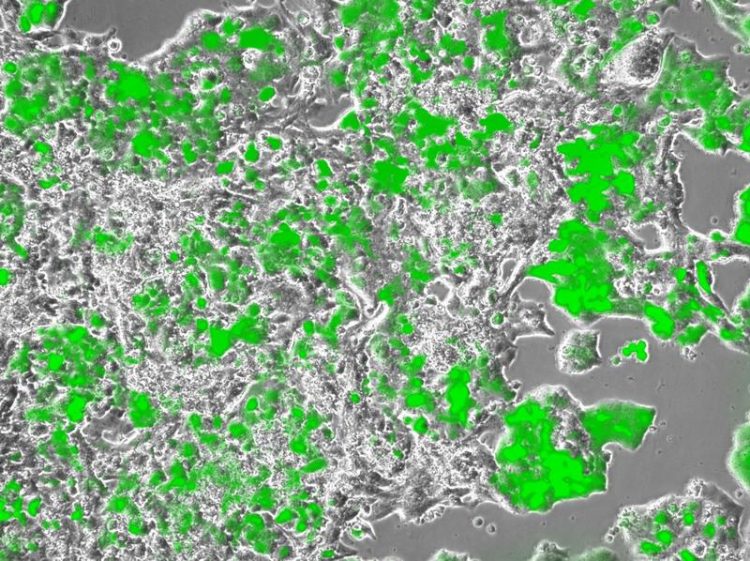Game Theory Explains Social Interactions of Cancer Cells

Public goods game network: Colorless cancer cells that do not produce IGF-II but need it for their growth reproduce in a population of green cancer cells that produces and consumes IGF-II. University of Basel, Daniela Ferarro
A tumor consists of a heterogeneous population of individual cells that compete for space and nutrients against each other. However, cancer cells also cooperate in their struggle for survival by sharing molecules, such as growth factors.
Cells that do not produce growth factors themselves have a proliferation advantage because they can use the factors produced by neighboring cells without the cost of producing them. What maintains this cooperation between tumor cells remains an open question and continues to obstruct medical therapies that target tumor growth.
Free riding cancer cells
The Public Goods Game is part of game theory and is used in economics as a model to analyze the provision of common goods. There is an imbalance in the consumption of these goods between those that provide them and pay the production costs and those that do not pay but consume anyway – a situation that is known in economics as the free rider problem.
The researchers now applied this model to the cooperation between producing and non-producing members of a cancer cell population, in order to examine if the model is also applicable to biological processes, such as carcinogenesis.
Using computer simulations, the researchers were able to calculate the long-term equilibrium between producing cells and “free riding” cells. They then used experiments with pancreatic cancer cells to test their calculations. Their results were in line with the predictions of the game theory model.
“Besides the finding that biological processes can be predicted by using computer simulations, our results suggest that further work on the 'social' interactions among cancer cells may reveal further insight into the dynamics of cancer, and hopefully guide research toward evolutionary stable therapies”, says Gerhard Christofori, Professor at the Department of Biomedicine of the University of Basel.
Original source
Marco Archetti, Daniela A. Ferraro, Gerhard Christofori
Heterogeneity for IGF-II production maintained by public goods dynamics in neuroendocrine pancreatic cancer
PNAS | doi: 10.1073/pnas.1414653112
Further information
Prof. Dr. Gerhard Christofori, Department of Biomedicine,University of Basel, phone: +41 61 267 35 62, email: gerhard.christofori@unibas.ch
http://www.pnas.org/content/early/2015/01/21/1414653112.abstract – Abstract
Media Contact
More Information:
http://www.unibas.chAll latest news from the category: Life Sciences and Chemistry
Articles and reports from the Life Sciences and chemistry area deal with applied and basic research into modern biology, chemistry and human medicine.
Valuable information can be found on a range of life sciences fields including bacteriology, biochemistry, bionics, bioinformatics, biophysics, biotechnology, genetics, geobotany, human biology, marine biology, microbiology, molecular biology, cellular biology, zoology, bioinorganic chemistry, microchemistry and environmental chemistry.
Newest articles

Silicon Carbide Innovation Alliance to drive industrial-scale semiconductor work
Known for its ability to withstand extreme environments and high voltages, silicon carbide (SiC) is a semiconducting material made up of silicon and carbon atoms arranged into crystals that is…

New SPECT/CT technique shows impressive biomarker identification
…offers increased access for prostate cancer patients. A novel SPECT/CT acquisition method can accurately detect radiopharmaceutical biodistribution in a convenient manner for prostate cancer patients, opening the door for more…

How 3D printers can give robots a soft touch
Soft skin coverings and touch sensors have emerged as a promising feature for robots that are both safer and more intuitive for human interaction, but they are expensive and difficult…





















